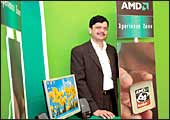|
Mea
culpa. That sums up the sentiment of this writer and this magazine.
You see, in May 2004, this magazine put Mphasis on its cover,
calling it Indian it's Next Big Thing (see Business Today, June
6, 2004). Since then, nothing much has gone right for the company.
Its revenues have grown quarter on quarter, but its net profits
have declined. Then, its IT-enabled services (ITEs) business has
grown faster than its IT services one. And so, in an effort to
grow its it services business, enhance its profitability and improve
its chances of breaking into the top tier of Indian it services
firms, Mphasis has embarked on a shopping spree.
Since June 2004, Mphasis has burned over Rs 200
crore on acquisitions in what Jerry Rao, its Chairman and ceo,
admits is a "move to enhance growth". "If we were
growing at 40-50 per cent-plus organically, we might not have
looked at making these acquisitions." That sentiment about
below-par growth is reflected in Mphasis' share price. Since April
1, 2004, it has, after adjusting for a 2:1 bonus, depreciated
by 2.5 per cent; in the same period, industry bellwether Infosys
has gained 72.7 per cent, and the BT Tech index 33.9 per cent.
All three acquisitions-Kshema, Princeton and Eldorado-are strategic
in nature. Thus, while the Kshema deal has helped the company
become a significant player in the embedded software space, the
Princeton one has gained it a foothold in the rarefied world of
consulting. Cynics like a Bangalore-based it consultant may have
questions about Mphasis' ability to integrate these acquisitions,
but everyone, including the said consultant, recognises that this
might be "Mphasis' last chance of making it to the big league".
-Venkatesha Babu
AMD
Boots Up
The chip-maker sends its global CIO to push
India business.
 |
| AMD's Marathe:
Offering a technologically superior alternative to Intel |
In
December last year, chip-maker AMD's global chief Information
Officer (CIO), Ajay Marathe, packed his bags from Sunnyvale, California,
and moved to Bangalore. It wasn't a case of yet another techie
returning home to launch a start-up. Rather, Marathe was sent
to India to boot up the chip-maker's India operations. Why now,
more than three years after AMD entered India directly (it sold
its processors through partners prior to this)? Simple. This year,
India will ship nearly three million PCs, offering AMD an opportunity
to increase its 14 per cent share of the local market. (Globally,
too, AMD has a 14 per cent share, compared to leader Intel's 85
per cent.) Says the suave Marathe, an AMD veteran of over two
decades and now President of its India operations: "I plan
to grow the Indian operations substantially since, along with
China, this is the marketplace to be."
Traditionally an also-ran to Intel, AMD has
been getting its act together in recent years. Long seen as a
maker of cheaper and relatively low-tech chips, AMD caught a lucky
wind with the K6, touted as the world's fastest microprocessor,
and continued to draw attention with its Athlon and Opteron processors.
It also helped that Intel stumbled with its Itanium processor,
which forced customers to make additional investments to tune
their software. Says Marathe: "For the first time we are
trying not to position ourselves as a cheaper alternative, but
as a technologically superior offering in the marketplace."
Just the same, there's a lot of catching
up that AMD needs to do. Rival Intel already has a huge R&D
centre in India, besides software and support centres. AMD, in
contrast, has just 40 people in its R&D centre in Bangalore.
It's upto Marathe now to leverage India to bridge the yawning
gap between the two rivals.
-Venkatesha Babu
VROOM
BMW Saga
 For
a company that sold a mere 150 cars in India last year, BMW has
hogged a disproportionate share of news columns. Ever since the
late nineties, stories have been written in business dailies of
BMW's imminent entry into India with its own manufacturing plant,
only to be followed by a rash of denials. In between, BMW has
been said to have looked at locations as varied as Gurgaon, Kochi
and Vizag. Ramesh Divyanathan, BMW's spokesperson in South-East
Asia, is a bit amused by the myriad and conflicting reports. "Yes,
BMW is interested in India, but there are no plans to open up
any facilities in the near future," he says. Ironically,
BMW's top brass itself may be responsible for the conflicting
reports. Recently, BMW Chairman, Helmut Panke, was reported stating
in Singapore that the carmaker was considering manufacturing in
India. At the moment, BMW doesn't even have a marketing office,
instead choosing to sell the handful of cars through two dealers
in North and West India. With India signing a free trade agreement
with Thailand last year, there's lesser incentive for BMW to make
cars in the country. In Thailand, it has a manufacturing plant
that exports to nearby countries. As for the stories, it's safe
to say that they'll continue to get written. For
a company that sold a mere 150 cars in India last year, BMW has
hogged a disproportionate share of news columns. Ever since the
late nineties, stories have been written in business dailies of
BMW's imminent entry into India with its own manufacturing plant,
only to be followed by a rash of denials. In between, BMW has
been said to have looked at locations as varied as Gurgaon, Kochi
and Vizag. Ramesh Divyanathan, BMW's spokesperson in South-East
Asia, is a bit amused by the myriad and conflicting reports. "Yes,
BMW is interested in India, but there are no plans to open up
any facilities in the near future," he says. Ironically,
BMW's top brass itself may be responsible for the conflicting
reports. Recently, BMW Chairman, Helmut Panke, was reported stating
in Singapore that the carmaker was considering manufacturing in
India. At the moment, BMW doesn't even have a marketing office,
instead choosing to sell the handful of cars through two dealers
in North and West India. With India signing a free trade agreement
with Thailand last year, there's lesser incentive for BMW to make
cars in the country. In Thailand, it has a manufacturing plant
that exports to nearby countries. As for the stories, it's safe
to say that they'll continue to get written.
-Kushan Mitra
Q&A
Am Not Worried By Offshoring"
 |
| "Our attrition rates are equal to,
or lower than the industry average here" |
On
his first visit to India, Stephen
Rohelder, Chief Operating Officer of Accenture, seemed
to be impressed both by Bangalore ("Wow!") and the progress
made by Accenture in India. With revenues of $13.8 billion or
Rs 60,720 crore (for the parent) last year, Accenture is 10 times
larger than its largest Indian competitor TCS.
In a free-wheeling interview with Business
Today's Venkatesha Babu, Rohelder
spoke about the role the Indian operations of the company play,
and competition from Indian it companies. Excerpts:
Accenture has been in India since 1987,
but until 2001 you had less than 1,000 people here. In the last
three years, you have increased that to around 12,000. Do you
think Accenture underestimated the potential in India?
Oh, no! I don't think so. We think we are
in the Indian marketplace at the right time. We have a tradition
of letting our market lead our expansion strategy. In 2001, our
customers wanted to lower costs and that is why we looked at alternatives.
Indian companies that started off in legacy
application support are now eyeing areas such as designing architecture
of IT systems, consulting, networking services and outsourced
R&D. Do you regret allowing them to grow this big?
We do not compete with Indian it companies
head to head at all. We probably see them in just 1 or 2 per cent
of our entire portfolio of offerings. Size, scale and credibility
are going to be a big challenge for them. Indian companies have
a long way to go. Their relationships are still at the it manager
and below, whereas Accenture has access to CXOs. I am not worried
about the offshoring model.
What is your take on competition from
Indian IT companies such as TCS, Infosys and Wipro. Infosys, for
instance, has spun off a separate division for consulting...
Accenture operates in 30 different industries,
48 different countries with more than 110 offices and 106,000
people across the world. Infosys is a very interesting company,
but has a totally different model. They want to be an Accenture
and obviously will take shots at Accenture.
At the end of the day we have a very unique
business model that is focussed on high value consulting, technology
services and outsourcing. We contract for outcomes, business results
and I still think that drives our growth and sets us apart not
just from the Indian firms, but the IBMs and the EDSs of the world.
There is a perception that MNC IT firms
have not got the India cost structure worked out completely...
I don't think so. We would not have been able
to scale up to the level we have done if it were not so. Even
our attrition rates are equal to, or lower than the industry average
here.
But MNC IT companies don't have the same
kind of net margins Indian players do...
As the tax benefits tend to go away in two-three
years, we will see where they will head. I am not going to look
at their margins and say how am I going to adjust my business
to achieve that. We are in different businesses.
Business process outsourcing (BPO) contributes
a significant chunk to your overall revenues. Are you looking
at making a big bang acquisition like IBM did with Daksh?
Our M&A (mergers & acquisitions) strategy
is focussed on niche acquisitions. In India, we have demonstrated
our ability to scale. Frankly, I don't see any acquisition on
the horizon. A third of our workforce in India is in the BPO segment.
|





 F
F